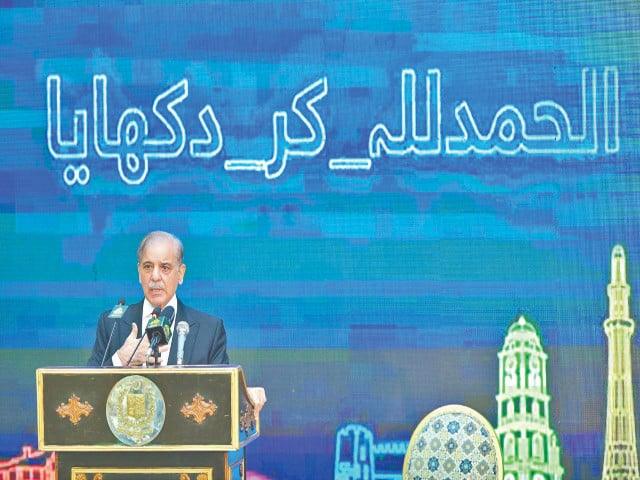Islamabad:
Prime Minister Shehbaz Sharif announced Thursday Reducing electricity prices by 15% or 7.41 RS per unit due to the adjustments of seasonal prices and by increasing neutral budgetary subsidies to stimulate the consumption of national grid and provide comfort to families in financial difficulty
The advantage was given to around 40.3 million consumers, mainly 35 million residential users.
The Prime Minister announced the new electricity rates at the Prime Minister’s office, during a ceremony attended by people from all walks of life.
Prices have been reduced due to the adjustment of quarterly prices, the monthly fuel cost adjustment, the resulting tax reduction and by increasing the subsidy funded by oil, according to government officials.
There is approximately RS3.40 per unit reduction due to the adjustment of quarterly prices, less than RS1 per unit of monthly fuel cost and increasing subsidy of RS1,71 per unit, they added. This will reduce the RS6 bill per unit and after adding the impact of taxes on the lowered price, the total impact will be RS7,41 per unit.
Compared to the existing rates, the internal electricity prices have been reduced by RS7.41 per unit and the new average rate will be RS34.37 per unit, said the Prime Minister and added that the price of industries electricity has also been reduced by RS7.69 per unit to Rs40.51.
The Prime Minister said that his government was to face “greater difficulties” to convince the international monetary fund to reduce electricity prices, despite the fact that it was not willing to allow the budgetary prices.
“The IMF did not allow us to reduce prices by increasing the rate of oil withdrawal, then I had to tell them that I would speak to the Director General of the IMF to obtain authorization because there was no impact on the reduction in budget prices,” said the Prime Minister.
The maximum relief of RS8.58 per unit or 12% was announced for commercial consumers and 7.69 rupees per unit or 13% for industrial consumers. Households received relief from RS6.14 to RS6.71 per unit, a reduction from 17% to 32%.
The Prime Minister granted the reduction credit to the Minister of the Power Sardar Awasi Leghari, to the privatization advisor Muhammad Ali and to the PM working group on the national coordinator of the power sector, LT General Zafar, who made the difficult task to convince ” The owners of the power plants to renegotiate their conditions.
According to new prices, there is no price reduction for Lifeline consumers by 100 units that have already paid much lower than the cost of producing electricity. Price of protected residential consumers with up to 100 units consumption have been reduced by RS6.14 per unit or 32% to Rs8.52 per unit.
The prices of protected consumers with 200 units have been reduced by RS6,14 per unit to RS11.51, excluding taxes. Consumers of up to 300 units will benefit from an advantage of RS7,14 per unit, but their rate will be RS34.
Residential consumers of more than 300 consumptions will obtain relief from RS7,24 per unit and their new rate will be RS48.46 per unit.
The average price of the national consumer will be RS31.63 with a drop in RS6.71 or 17%.
This is also a small relief, which has been obtained by ingenious methods, said the Prime Minister, while recognizing the difficulties faced by households and industries.
A retiree ended up with empty pockets after paying his electricity bills and these high invoices caused the frustration and anger of people, admitted the Prime Minister. He said that the government undertook structural reforms in the power sector to ensure additional relief for consumers and the country’s overall development. “This reduction will help manufacturers produce cheaper and more competitive products.”
The revised rate of commercial consumers will be RS62,47 per unit with a reduction of 12%. The new rate of industrial consumers will be RS40.51 per unit after a reduction in RS7.69 or 13%. The agriculture rate will be RS34.58 after a reduction in RS7.18 or 17% of prices.
The Prime Minister has also established the agenda for new reforms in the electricity sector, giving a task to his “star team” to start working on the elimination of more than 600 billion rupees per year due to the flight and low recovery of bills.
The Prime Minister said that the other two objectives of his government were to establish a free electricity market and to privatize or provincialize electricity distribution companies (Discos) to reduce the burden of line loss and theft of electricity on the national treasury.
Appreciating the working group formed to finalize the reforms of power, the Prime Minister said that the force had worked very hard and thanks to their innovative thoughts, they brought different options and managed to convince the IMF to reduce the prices of power.
“We have not adopted the low international oil prices and have kept the prices to ensure that the government will reduce power prices to which the IMF was in principle agreed,” he added.
The Prime Minister said that the government had succeeded in negotiating with independent power producers (PPI), which would allow 3.7 billions of rupees over a period of three years to 25 years of the remaining lifespan of these power producers.
The Prime Minister said that the circular debt of 2.4 Billions of Rupes was also treated, which will be brought to zero over a period of five years.
The Prime Minister said that Pakistan was on the default over a year ago and that it was to supervise this letter of credits for the importation of petroleum products and other essential items are open in time. “We had no resources to even manage the electrical sectors,” he added.
The Prime Minister said that the Pakistani economy had now stabilized and had evolved towards sustainable growth and development.
“The country’s economy really needed surgery to get rid of all the problems responsible for the economic sector crisis,” he added.




